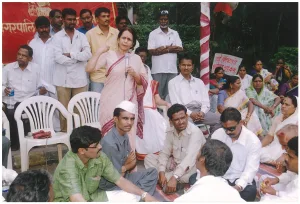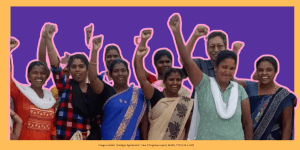‘I Am Furious With How State, Politicians Neglect The Poor And Marginalised’
In the bastis of east Mumbai, trade union leader Sangeeta Kamble is an ally and friend of the
- Priyanka Tupe
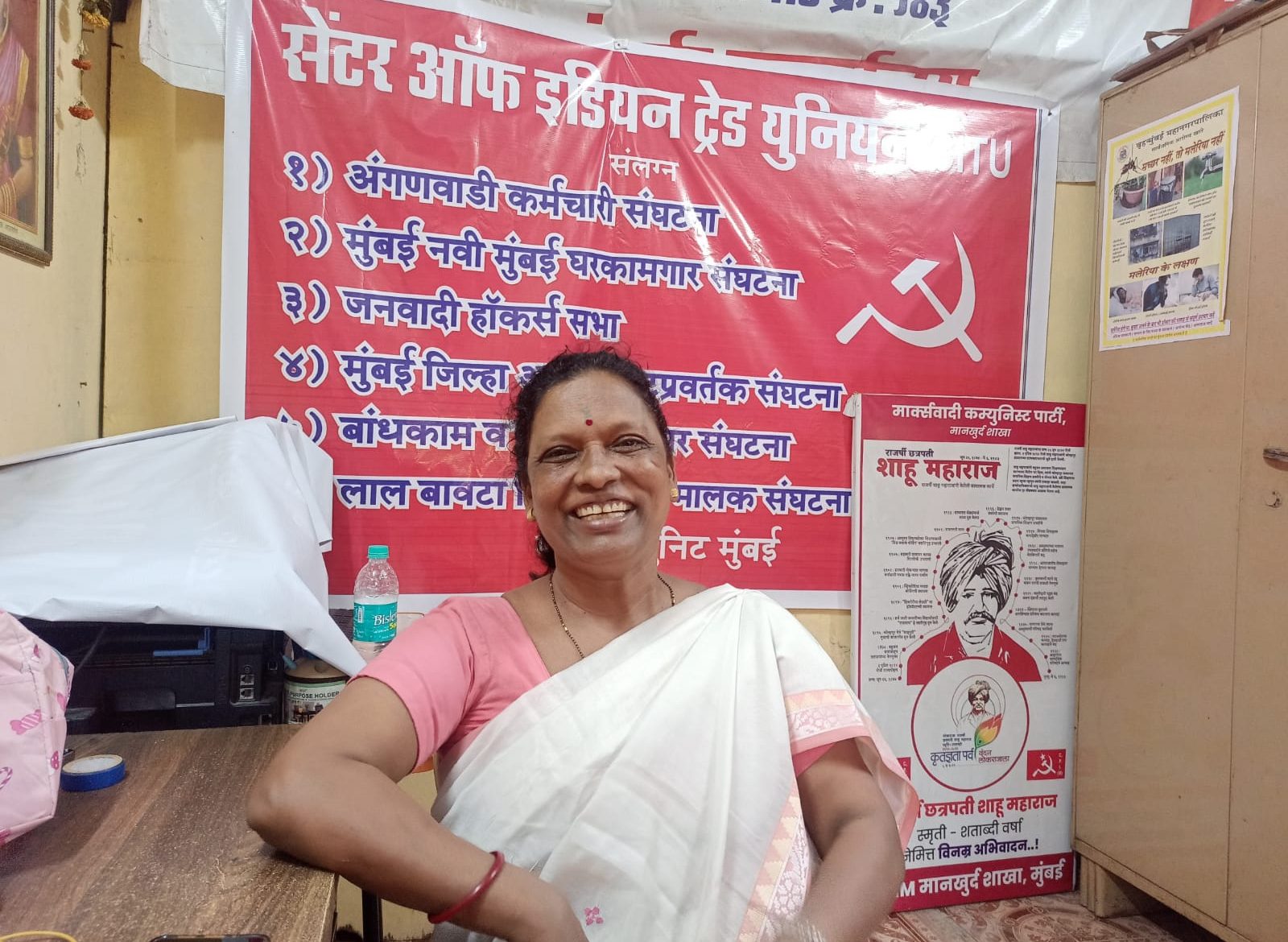
Finding Sangeeta Kamble’s office in Samta Nagar is easy because she is known to every hawker in this slum settlement in eastern Mumbai’s Mankhurd area. The trade union leader’s sparsely furnished, tiny one-room office is welcoming and busy, with a steady stream of visitors from the basti (slum settlement).
In the morning hours, this office functions as an Anganwadi centre. There are old tarpaulins, boards and banners scattered around in cheerful chaos, and the only furniture is a cupboard and some chairs. Unlike most union offices, there are no photographs of Karl Marx or Babasaheb Ambedkar decorating the walls. But Kamble says her beliefs are embedded in her heart and mind, beyond token nods to icons. Her campaign to unionise people is the essence of the philosophies of Marx and Ambedkar anyway, she points out.
“Have you seen the film Jai Bhim?” Kamble asks, referring to the Tamil courtroom drama released two years ago. “The hero who is fighting oppression does not carry all the cultural symbols and idols of the time, but their philosophies are reflected in his work. I believe the same, so you will not find photos of Babasaheb and Marx even in my home.”
But when it comes to the women reformers and activists of Maharashtra, Kamble thinks differently. Her office walls are packed with images of historical and contemporary figures such as Savitribai Phule, Fatima Shaikh, Jijabai Bhosale (Shivaji’s mother), Ramabai Ambedkar and Ahilyabai Holkar. “Women leaders have not been celebrated the way men have been, their histories, work remains undocumented, so I deliberately put these up in the office,” she says.
Kamble, 50, is the joint secretary of the Mumbai unit of the Center of Indian Trade Unions (CITU). But it is her role as head of different smaller mobilisations in Mumbai of the state that marks her apart. She is the working president of the CITU’s state Anganwadi Karmachari Sanghatana which has 12,000 members. She has also mobilised 450 domestic workers in Mumbai during the Covid pandemic. She has unionised the city’s street hawkers and advocated for their issues as she is also a central committee member of All India workers and helpers federation – CITU, and is now doing the same with its auto-rickshaw drivers.
Kamble comes from an acutely poor and disadvantaged Dalit family of rural Kolhapur and her rise to the leadership position in trade unions has been fraught with painful decisions and challenges. She has worked as an unpaid Anganwadi teacher, made and sold snacks to earn a living, taught herself to fight for public causes and created a political space for herself in the Communist Party of India Marxist (CPIM).
She has not forgotten the struggle, anxiety and humiliation of those who are forced to remain at the last rung of India’s social and economic hierarchy. Which explains why she has refused top roles in the CPI(M) to focus on hyperlocal issues of Mankhurd’s bastis.
“These are my people, I love them. It’s my duty to fight for them. It is because Babasaheb Ambedkar fought for us that we are where we are today. We have been exploited in many ways by oppressor castes and even today they do that. Even in 2023 we are struggling for drinking water, sanitation, proper roads and street lights,” she says.
This is the first in our new series on women trade union leaders. Trade unions have had a pivotal role to play in shaping our labour laws and workers’ rights. As labour rights dwindle, women union leaders are at the forefront of the struggles. But they remain largely invisible and unrecognised. Through this series we hope to accord them a rightful place in history.
Breaking The Caste Barrier
When we meet her in her office, Kamble is smartly turned out in a crisp white sari, with a red bindi marking her forehead. She says she follows Ambedkar’s belief – that those from marginalised communities should present themselves confidently to the world. “I like to dress up. I don’t prescribe to the idea of simple living like many Leftist leaders. Because for us (Dalits), wearing fancy clothes and make-up was a forbidden luxury. It is for high class people to be simple because life gives them so many options. Wearing a nice saree is a freedom I have achieved because I worked hard to earn the money that pays for it,” says Kamble.
There is a reason why Behanbox chose to start this series with Kamble. Trade union leaders from the Left spectrum in Maharashtra have mostly been upper castes and while their contributions to the labour movement have been significant, the lack of diversity in these positions was telling. Kamble was among the earliest voices of change. She is relentlessly ambitious for the collectives and movements she leads. Her latest campaign is to ensure that Mankhurd’s street vendors are allowed to earn a living with dignity.
To strengthen her campaign Kamble is looking at contesting the Mumbai’s municipal corporation elections which were due in 2023 and likely take place in 2024. She had contested the same election in 2007 as an independent candidate but lost. But she has not given up.
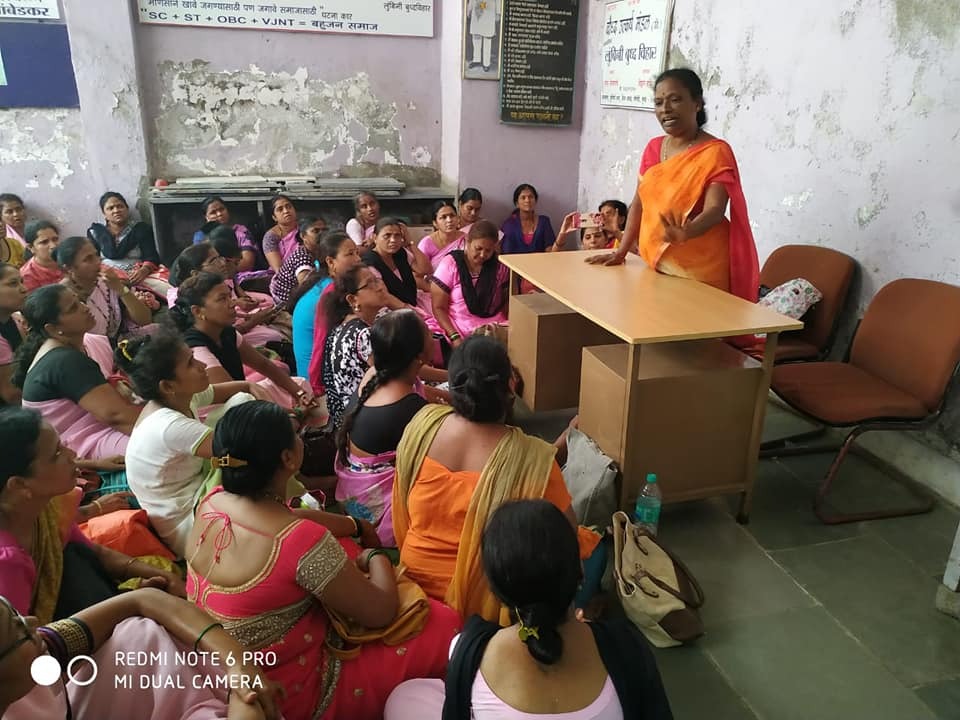
Meena Vishwakarma and Sudhir Sonawane, Kamble’s colleagues, are busy putting together the many applications of welfare schemes that have arrived at the office. Two women from the basti walk in with applications for the membership of the hawkers union. And Kamble puts our interaction on hold. “People first,” she says with a smile.
The two women from Samata Nagar area say Kamble’s enthusiasm is infectious. “Tai enrolled our names in self-help groups, now we’ll get loans for our businesses. She also helps us with information on how we can fight for our rights and protect thelas on the streets as well,” says one of the women in a burqa.
Empathy comes to Kamble because her own lived experiences have taught her its importance.
Family History Of Rebellion
Kamble comes from a poor Dalit family based in Kolhapur and like her forefathers, she has had to struggle for everything, from education to livelihood options. Dalit families, who are mostly landless, face caste oppression everywhere in India. Her family did not take up an exploitative casteist practice imposed on Dalits by oppressor castes in Maharashtra – Dalits were asked to clean the households and yards of families from oppressor castes and given a handful of food grains and stale food as a remuneration. Similar casteist practices are found in the other states of India even today, as Behanbox has reported.
Kamble’s grandmother and father made a living by cultivating the land of other villagers. And it was her father’s staunch refusal to clean the homes of upper caste families for a handful of grains that inspired her to make it on her own despite several odds. She attended school at a time when there was no electricity, transport facilities, or colleges in her village but was married off right after matriculation. But her husband’s family had promised to let her continue her education.
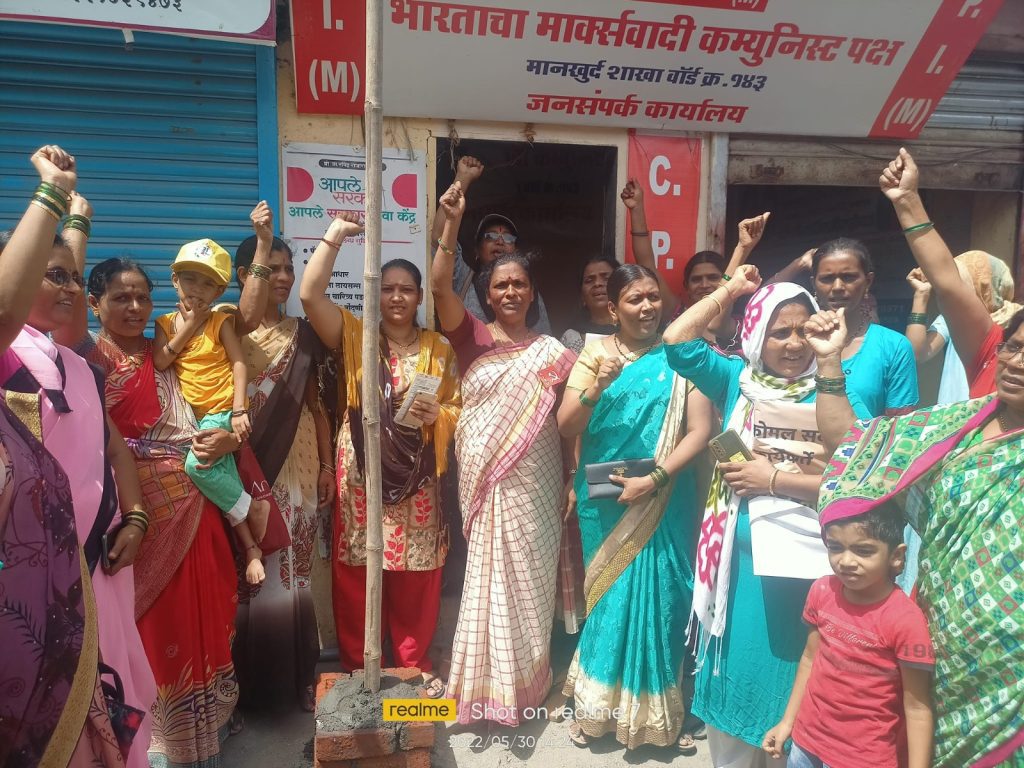
Acute poverty forced Kamble to migrate to Mumbai with her husband in 1997. It was a painful decision. “We had very little money, almost nothing. We had to leave our children with my sister at the village, as there was no house, job. It was heartbreaking for me as a mother, but we had no option,” she recalls.
With no support from her family the couple arrived in Mumbai with just Rs 100 in hand. The couple first took refuge at central Mumbai’s famous Mahalaxmi Temple and the city of dreams embraced her with no food or water. She found a job as a caretaker to a patient in a south Mumbai home at Rs 3000 a month. Her husband remained jobless.
Kamble rented a house in the Mariyam Nagar slum located in Worli, a world far moved from the plush flat near Hanging Gardens where she worked. “I could never imagine anyone living in such a big house. It was the first time I saw a western style commode, heard a flush. It was difficult initially to get used to the city, especially the commute on a Mumbai local train. It can be intimidating for any woman who is experiencing this for the first time. Today I travel to Punjab, Kerala and Delhi for party conclaves and I encourage our women party workers to get out of their homes and roam around the world,” says Kamble, her eyes sparkling with pride.
Learning To Mobilise
In 2000, Kamble moved to the Bhim Nagar area in Mankhurd and this proved to be a turning point in her journey to becoming a union leader. She started working as an Anganwadi teacher but she would also help the people in the area with civic issues. Bhim Nagar had no toilets, electricity, or drinking water and she started a conversation with the women in her neighbourhood on these issues.
Kamble was furious. “Municipal authorities, local politicians, all were indifferent to the suffering of the poor. Who would have looked at us, our issues? The only way out was to take ownership of the situation and do something for the basti,” she says. Her proactiveness is what helped her build quick and firm links with the women in the neighbourhood was her outspoken, sociable nature.
Today, her union of nearly 600 female domestic workers is registered with the state government. During the pandemic the Maharashtra government was offering a one-time cash transfer of Rs 1500 to domestic workers registered with them. Kamble helped helped 600 women with the registration process and then helped 200 of them to unionise under CITU. She has been fighting for a social security policy for domestic workers, pension for elderly domestic workers who can no longer work and for provision of higher education for their children.
Her early outreach attempts came to the attention of CORO – Committee of Resource Organization – a rights-based NGO in Mumbai and it offered her a paraprofessional course in social work. “This course was immensely helpful in understanding social issues, community and solution mechanisms. It helped me solve the rationing (PDS) problems of my area. We protested against corrupt practices at ration shops and forced them to maintain a register, where women could put down their complaints,” she recalls.
The efforts paid off and women began finding it easier to demand and get their share of food grains. It also taught the women who participated in and gained from the campaign, that PDS was a right, not a favour granted by the government.
Soon after, Kamble formed a registered collective, the Vishwashanti Mahila Mandal, with the support of the renowned feminist activist Biju Bhosale. It formed more than 200 self-help groups of women in the area. The Mandal mostly helps women in getting loans for small enterprises, education of their children but it also functions as a pressure group. It is also a safe space for women.
“Women come to us with their family disputes and mostly complaints of domestic violence. We intervene whichever way we can, try to have a dialogue with families but when that does not work we go to the police and help the women to file complaints and avail legal avenues,” says Kamble.
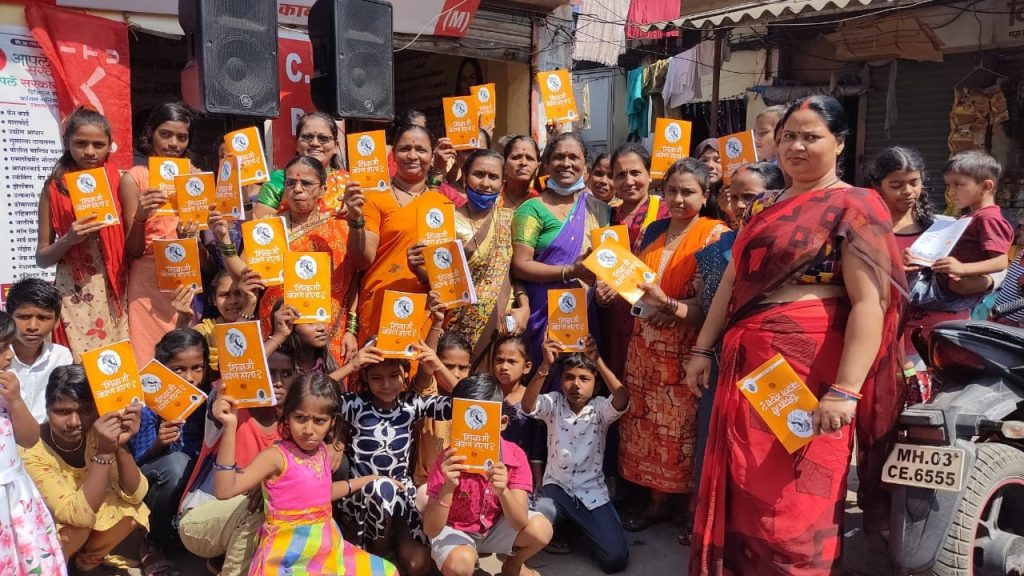
Dedicated Teacher
Passionate about education and nurturing spaces for children, Kamble voluntarily surveyed 250 households in Bhim Nagar and found that the colony sorely needed Anganwadis. Aabasaheb Jadhav, the then education officer, set up two Anganwadis and with the backing of a local NGO, Kamble recruited women from Bhim Nagar to run them.
For two years, as she ran the Anganwadis, she went without a salary because the NGO withdrew support and the government refused to pay. This was her first encounter with the plight of Anganwadi workers.
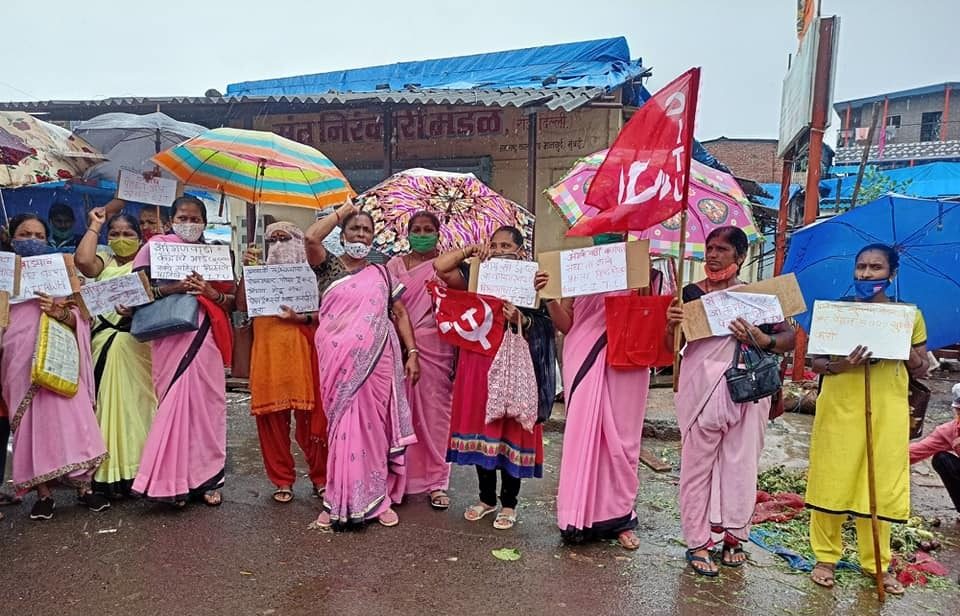
“Being an Anganwadi worker is not easy. The government pays us very little and that too not on time. I ran my Anganwadi because I love children,” Kamble points out. “Teaching children is pure joy and it keeps me sane amidst all the chaos. And I can’t separate it from the other political activities, so I run my office in the same room when Anganwadi classes are over.”
Fair and timely pay and the provision of social security is a long-time demand of Anganwadi workers, as Behanbox has reported.
The Eviction Battle
Kamble’s reputation as an activist began to spread and soon, neighbours started coming to her for help against the threat of forced eviction. These houses were built around 15 years ago in Bhim Nagar, at a time when there was no clarity on who owned the land. In 2005, a landowner asserted his claim on the area and alleged that the homeowners had encroached on his land. Kamble unionised the community and fought the case in a civil court. She brought a stay order on the eviction in 2013 but later lost the case in the Bombay High Court. However, her efforts for interim relief bought 82 poor families three more years in their homes.
Kamble acknowledges the support of other activists in the field.
A turning point in Kamble’s life came when she met Shubha Shamim and Armaity Irani, prominent CPI(M) union leaders in Maharashtra. Irani is a veteran CITU leader working for the rights of domestic workers in Mumbai and Shamim, currently the state secretary of CITU, has been leading the Anganwadi workers’ struggle for years. The two leaders backed her work in the land encroachment case in Bhim Nagar by offering legal knowhow and resources.
“Tyanchya kamatun nehmich mala prerana milali, aapan pan yanchyasarkha niswarthipane kashtakari wargasathi kam karayala pahije asa vatu lagla (their constant support, commitment and selfless struggle inspired me to work for the working class),” she says.
Kamble went on to complete school and push through with a BA and MSW degree (Masters in Social work) at the Yashwantrao Chavan Open University. For all her triumphs in the public sphere, Kamble was facing many challenges at home. Her husband was a daily wager and the family was often financially strapped. But her work with the encroachment case had earned her some money. She also ran a small enterprise with a self help group that sold readymade food and other items and earned around Rs 12,000 a month.
The Turning Point
Devastating floods swept Mumbai in July 2006, killing at least 1000 people and leaving 14,000 homeless. It was the relief work she undertook during the crisis, bringing food, ration and material to the affected, that made Kamble a popular face among people, political parties, and politicians. Offers came in to join parties and Kamble decided that it was time to politicise her work.
“When I felt I should work more politically, there was only one option for me – the CPI(M). People affiliated to the party that I knew had helped me personally. I used to see how they talked to people, how respectfully they treat working class people. I chose to be a karyakarta (worker) with CITU. I feel this is the most democratic party within,” says Kamble.
The activist’s skills lie in mobilising a community to raise its voice against injustice and demanding its rights and this work she does after the workday ends at 6.30 pm. She organised awareness camps in the Samta Nagar basti, helping women and senior citizens deal with the red tape around welfare schemes. One of Kamble’s most vigorous campaigns is to foster women-led small businesses using public schemes.
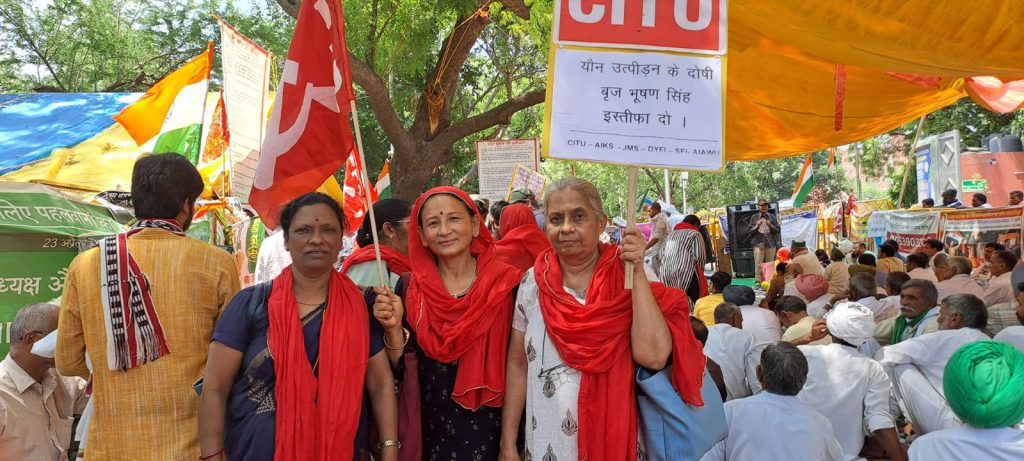
“I learnt about the schemes and understood the paperwork necessary for these. Mobilising people, public speaking, everything is self learnt and sometimes the CORO training helped. It’s extremely important for people like us to learn things on our own because we do not come from the background of academia or activism,” she says.
Kamble knows the importance of cultural intervention in knitting a community together. She invested in building a community hall in Samata Nagar. It’s a 300 sq feet room covered with a tin shed. Earlier, it was a dark, unfriendly space where only men would venture, to drink or do drugs. Now it is used to host annual days marking the work of the state’s great reformers and to host self defence and tailoring classes.
“Tyaaivaji aata tithe changla kam chalta, karan hall bandhun aamhi ti jaga aata aamchya samajik karykramasathi vaparto (We have reclaimed this space for social causes),” she says with pride.
Crisis Management
Mankhurd is inhabited mostly by Dalit and Muslim labourers from the unorganised sectors and the pandemic had hit them really hard. There was the loss of daily wage, the challenge of social distancing in tightly packed homes and lanes and the hurdles to accessing healthcare.
Kamble worked with her contacts in the NGO sector to distribute Rs 16 crore in two phases to needy people in Samta Nagar during the pandemic. Most of them are unorganised workers who were left jobless. She surveyed households, listing those who were in desperate need of help.
“It was the waste pickers and the sanitation workers who had been hit the hardest because everyone saw them as carriers of infections. No one would help them so it was most important to help them get safety and relief kits,” she recalls. She also persuaded the municipal authorities to organise a vaccination camp in the area when she saw people struggle with online registration for the vaccine.
‘No Easy Way For Women In Politics’
Kamble believes firmly that women make for more effective leaders in a crisis. But they still have to fight many odds.
“Women in politics have no easy way,” she says. She recalls being threatened by powerful lobbies and local goons, especially those furious with her effort to reclaim public spaces. “A couple of years ago we had started building the community hall and a mawali (hoodlum) incited the basti’s people alleging that I was doing this for my own interest. I went to meet him but he didn’t want to talk. He came at me with an iron rod and if it was not for my colleague Meena Vishwakarma’s intervention he would have attacked me,” says Kamble.
She is forthright about her own experience of domestic abuse. “If you are in public life, you have to go out and meet different people everyday. But people incite my husband saying I am not a woman of a ‘good character’, that I always roam around, meet hundreds of men. You know what that means right? So my husband used to abuse me sometimes,” she says. Her face is devoid of emotions as she says this, an acknowledgement of how widespread domestic abuse is. “But my journey inspired him, helped him change his mindset and now he is supportive, helps me with everything, ” she says.
Gaining the trust of the community and her family’s support has been an uphill task for her. “Now nobody raises a finger at me, my record is as clean as one can have. But this takes a lot. I don’t take anything for granted but that does not stop me from doing my work,” she says with a smile.
It has been alleged that Dalits on the Left are not given leadership positions and used only as foot soldiers. But Kamble denies having to deal with any bias. “The CPI(M) has given me an identity and unconditional support throughout, bestowing on me important positions and responsibilities. Shubha Shamim, our senior comrade, has always ensured that not only I but all those who are working hard get leadership space and visibility. People who haven’t experienced the party culture and work environment may not have the idea and they believe this [anti-left] rhetoric,” she counters.
As a member of all India workers and helpers federation – CITU,Kamble is now battling red tape to get licences for the hawkers in Mankhurd. A survey conducted by the government in 2015 to legalise their work came to nothing but she is persevering with the bureaucracy in a bid to end the precarity of their lives. “There is metro construction going on everywhere, and officials evict vendors with no warning. So we are asking that vendors be given a separate permanent zone,” she says.
We believe everyone deserves equal access to accurate news. Support from our readers enables us to keep our journalism open and free for everyone, all over the world.
